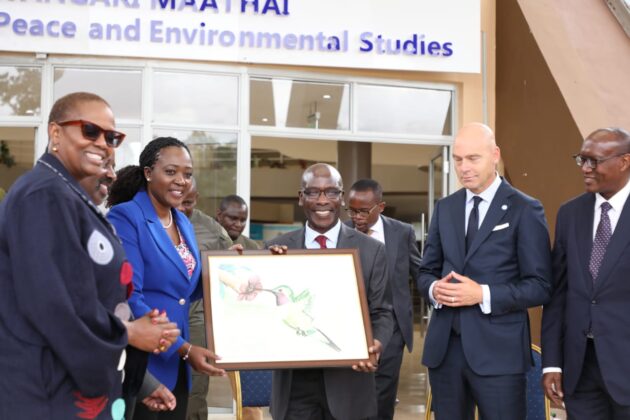Environment, Climate Change and Forestry Cabinet Secretary Soipan Tuya on Monday represented President William Ruto at the official opening of the Wangari Maathai Institute for Peace and Environmental Studies at the University of Nairobi’s Upper Kabete Campus.
The Institute, whose construction commenced in 2016, was set up by the Government to advance the legacy of the 2004 Kenyan Nobel Laureate Prof Wangari Maathai.
The institute was handed over to the University of Nairobi in May 2019.
Speaking at the launch, attended by the University of Nairobi’s top leadership led by Chancellor Dr Vijoo Rattansi, acting Vice Chancellor Prof Julius Ogengo and Chair of Council Prof Amukowa Anangwe , CS Tuya said the institute would immortalize Prof Maathai’s legacy and thanked various partners for supporting its construction.
“Thank you too for immortalizing the great Nobel Peace Laureate Prof Wangari Maathai by establishing this institute. I would like to, in a very special way, thank the African Union, the African Development Bank, the Clinton Global Initiative, DANIDA and all the partners who helped make this institute a reality,” Hon Tuya said.
“I am informed that the institute aims to carry forward Prof Maathai’s legacy by promoting research, education, and community engagement in the field of environmental governance, cultures of peace, climate adaptation, sustainable development, and conservation,” she added.
The Cabinet Secretary recalled Prof Maathai’s exploits as a scholar and environmentalist noting that besides making history as the first African woman to be awarded the Nobel Peace Prize in recognition of her environmental work, she had set other records including being the first woman in East and Central Africa to earn a PhD in biology.
“As Kenyans, we forever remain proud of Prof Maathai’s achievements. In fact, I personally draw so much inspiration from her in my day-to-day work as Cabinet Secretary responsible for environment, climate change and forestry because as you know she also served in the Ministry as an Assistant Minister,” CS Tuya said.
The Cabinet Secretary said her Ministry will collaborate closely with the Wangari Maathai Institute (WMI) on programmes that will help Kenya and the region to overcome challenges posed by climate change including conflicts over shrinking natural resources.
“I would like to challenge the faculty and students at this institute to especially research and conceptualize the practical nexus of environment, conflict, and peace.
“Emerging evidence and statistics are stark, including the 6th IPCC Assessment Report which shows that environment and climate factors are becoming critical drivers of insecurity, manifesting in inter and intrastate conflicts, with Africa being specially affected,” CS Tuya noted.
Hon Tuya also spoke at length about ongoing climate action programmes in her Ministry including the 15 billion national tree growing and ecosystem restoration programme, sustainable waste management, and the forthcoming inaugural Africa Climate Summit in Nairobi.
“The late Professor Wangari Maathai led Kenyans and the world to plant trees and to build strong nature-based livelihoods especially for women and youth at the community and grassroots level.
“My Ministry is building upon this legacy to carry on with this work, by leading Kenyans in planting and growing 15 billion trees in the next 10 years as directed by H.E. President William Ruto.
“In this coming short rain period between September and December 2023, we are planning to lead the country in planting and growing 500 Million seedlings, and we would like to welcome each and every Kenyan to join us in this program,” CS Tuya said.
On the first ever Africa Climate Summit scheduled for KICC from 4th to 6th next month, CS Tuya said the African Union meeting, to be staged alongside this year’s United Nations annual Africa Climate Week, will be a platform for Africa to showcase her climate change adaptation, resilience and mitigation potential.
At the same time, the Cabinet Secretary regrettably noted that Kenya was still facing environmental governance and conservation challenges that the late Prof Wangari Maathai battled throughout her professional life including illegal logging of public forests.
“The obstacles of governance in the environment sector are still rife, as it was during her time. We have seen illegal logging spiral in the forestry sector, forest fires, pollution, and failure in the waste management sector amongst others,” CS Tuya outlined.
She said her Ministry was taking proactive measures to overcome the challenges including the recent recruitment of 2,700 rangers to help deal with the problem of illegal forest activities, and deployment of ultra-modern forest fire management technologies.
Other speakers at the launch included Dr Rattansi and Prof Ogeng’o as well as Prof Maathai’s daughter and environmentalist Ms Wanjira Mathai. Global Centre for Adaptation CEO Prof Patrick Verkooijen and Prof Anangwe also spoke.
Dr Rattansi said the late Prof Maathai will forever be remembered by Kenyans for the obstacles she overcame to become the country’s climate action icon way before the subject become popular.
“The late Prof Wangari Maathai holds a special place in our hearts; first and foremost, as our member and secondly and perhaps more importantly, for the obstacles that she overcame, whether personally or politicly, to secure her place in our nations’ history as an agent of change.
“Many years before talk on climate change became fashionable, the late Prof Wangari Maathai had cut herself out as a significant contributor in caring for the environment and thereby, mitigating the adverse effects of climate change,” Dr Rattansi said.
On his part, Prof Ageng’o thanked the Government and partners for supporting the establishment of the institute saying it would not only help institutionalize the legacy of the departed Nobel Laureate but also act as a centre of excellence in advanced environmental education.
“The University of Nairobi is grateful for the Government’s commitment to institutionalize the legacy of Prof Wangari Mathaai and foster the positive ethics, values and practices that defined her life.
“By promoting the planting of trees in the fields and in the minds of young people through holistic education, we are preparing them to embrace the connectedness of environmental conservation and climate action for responsible leadership for tomorrow,” Prof Ageng’o concluded.



